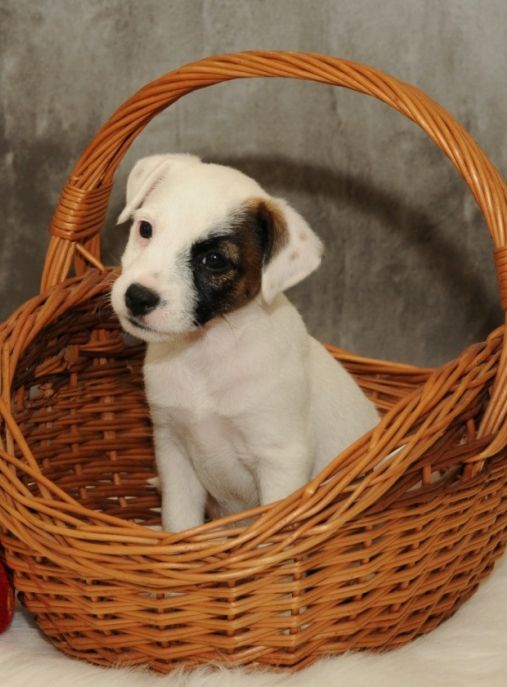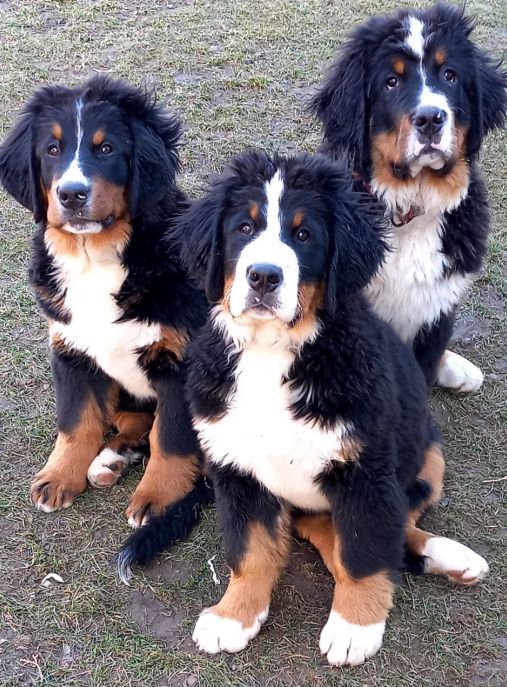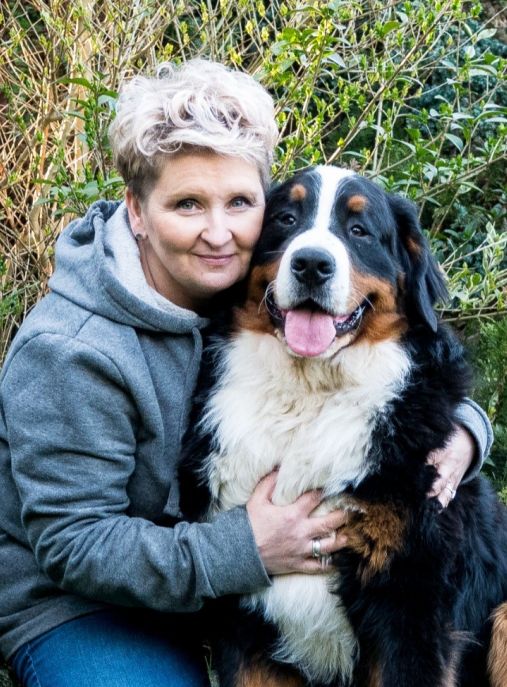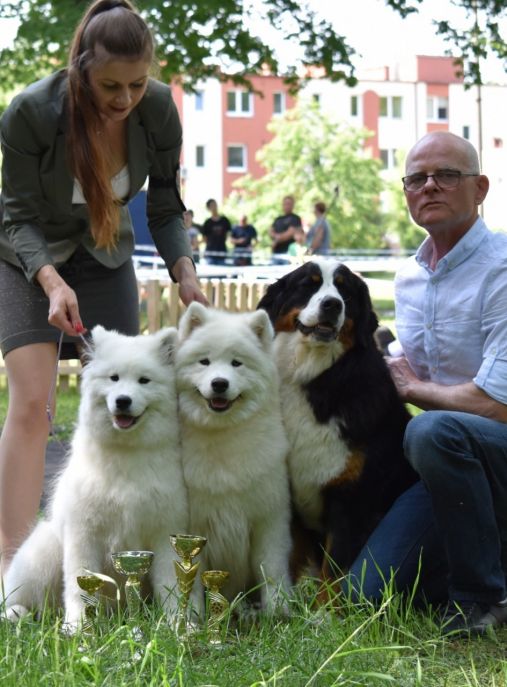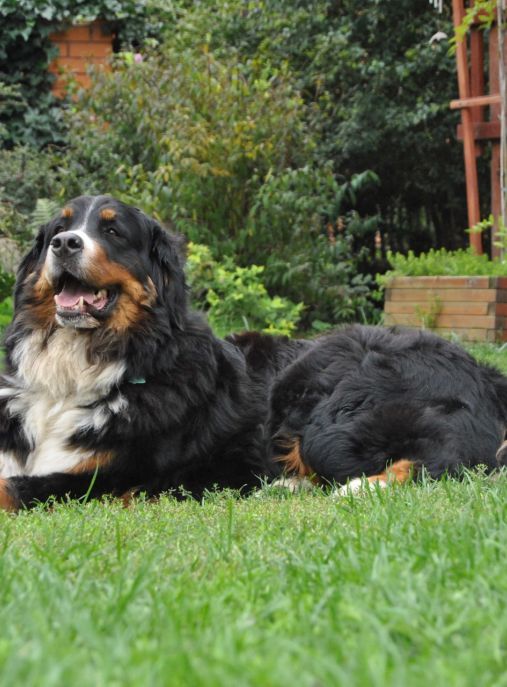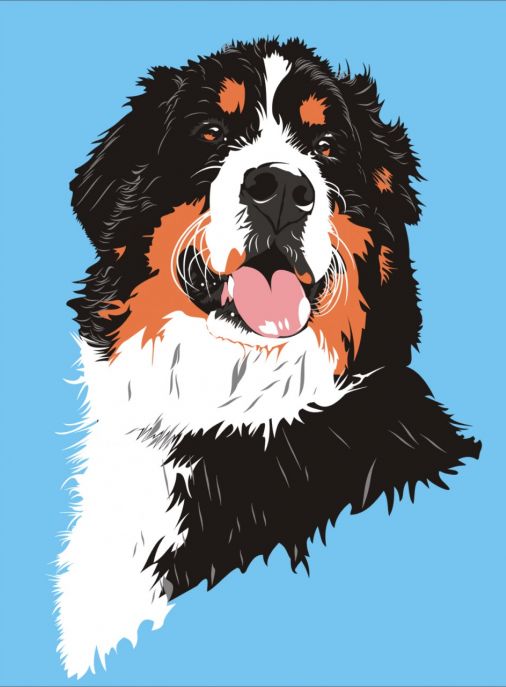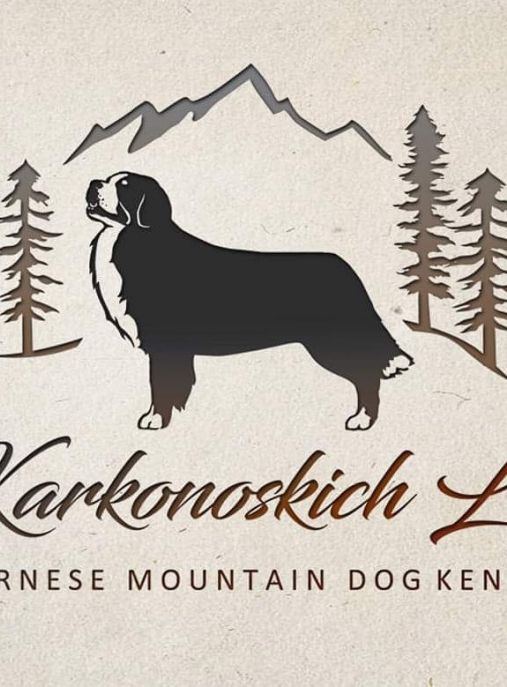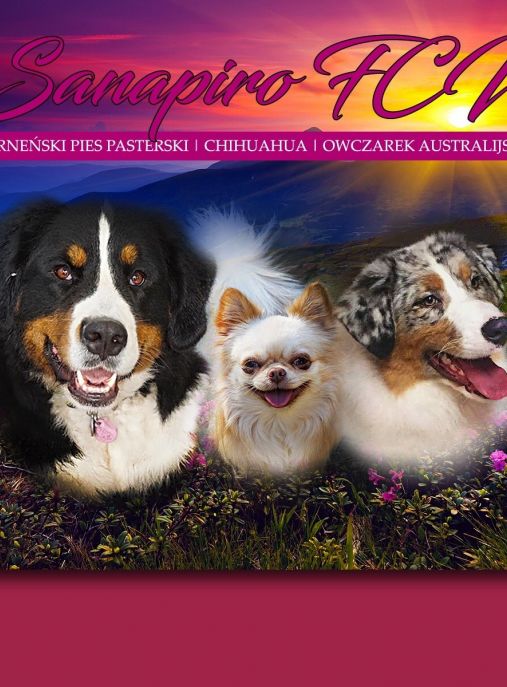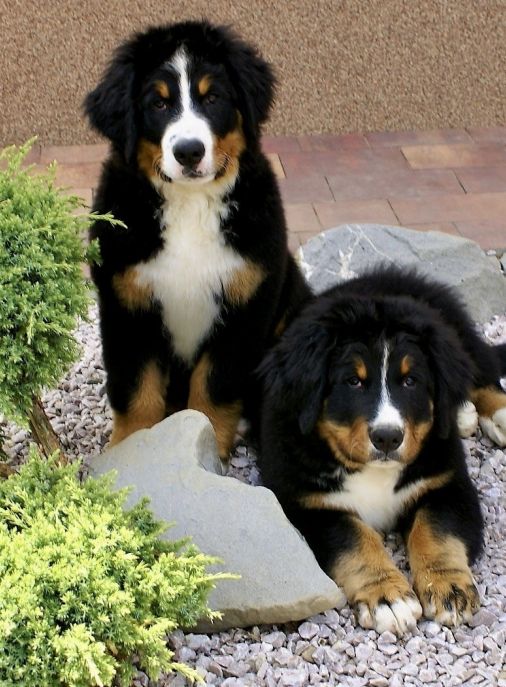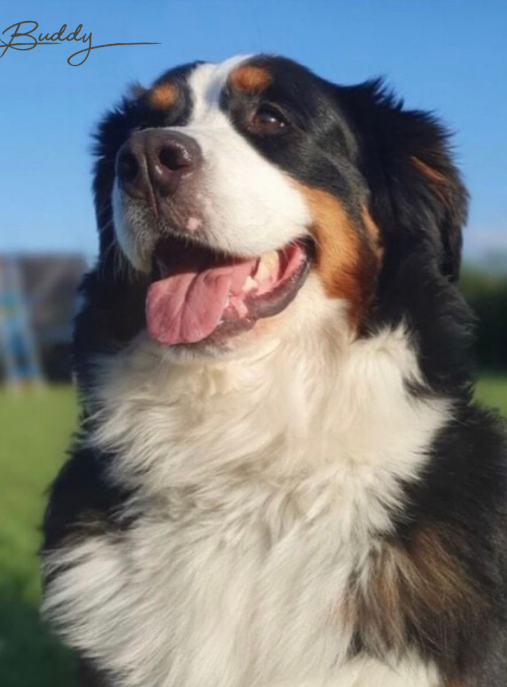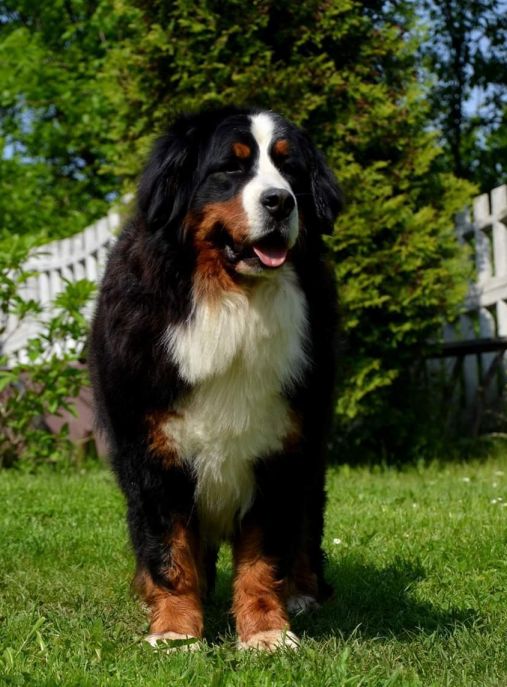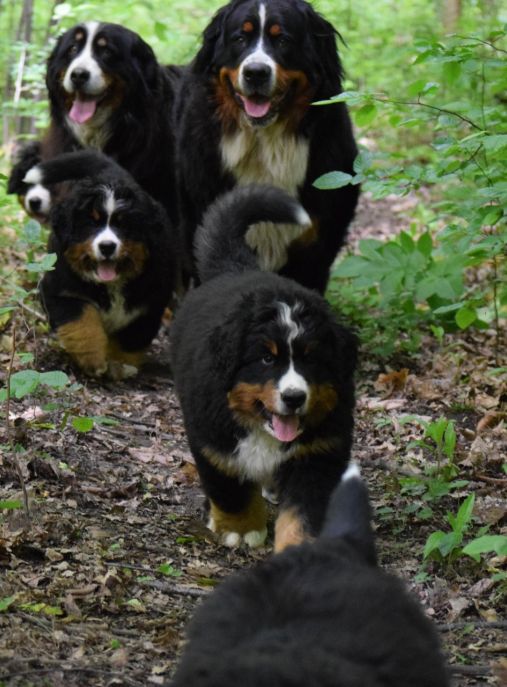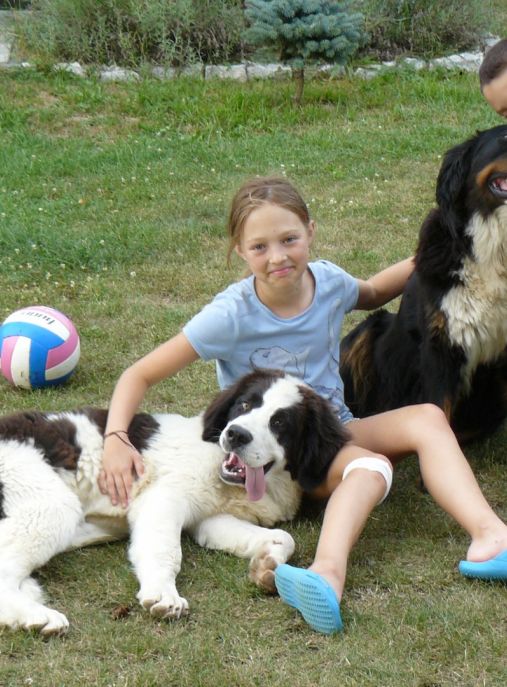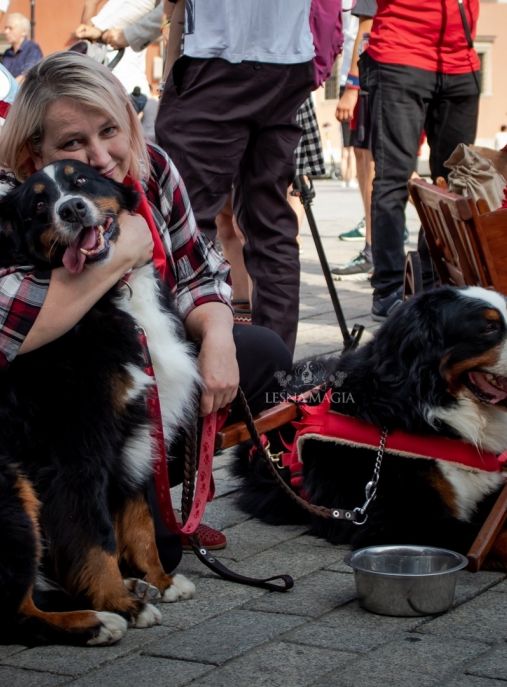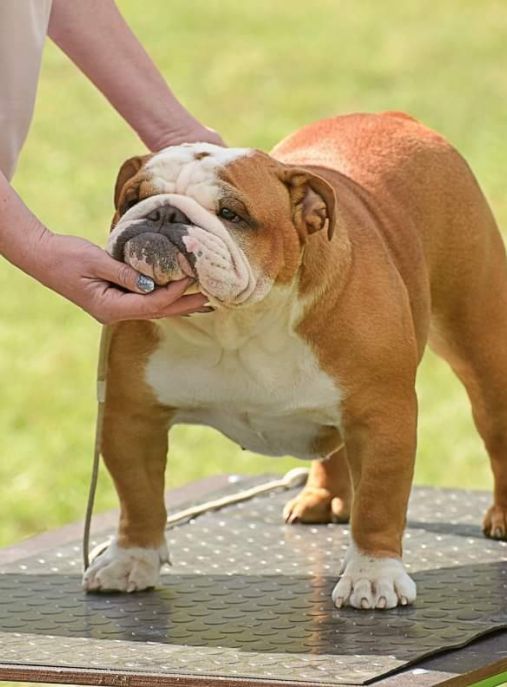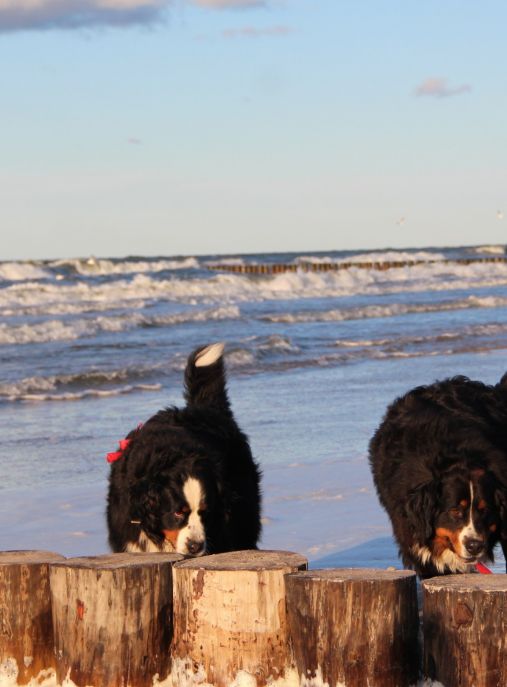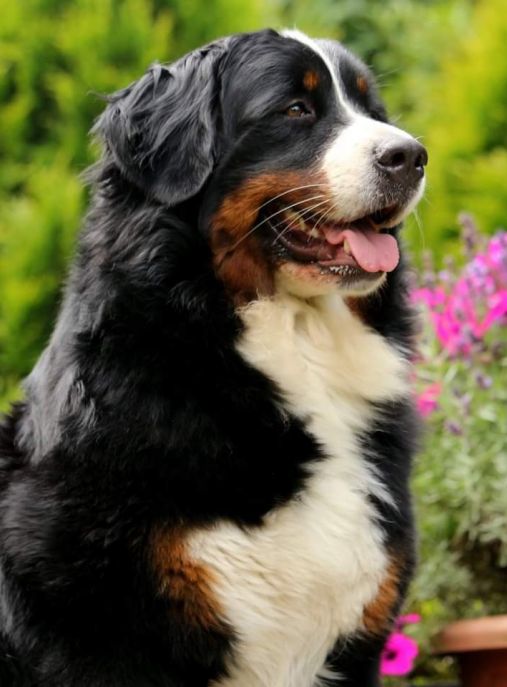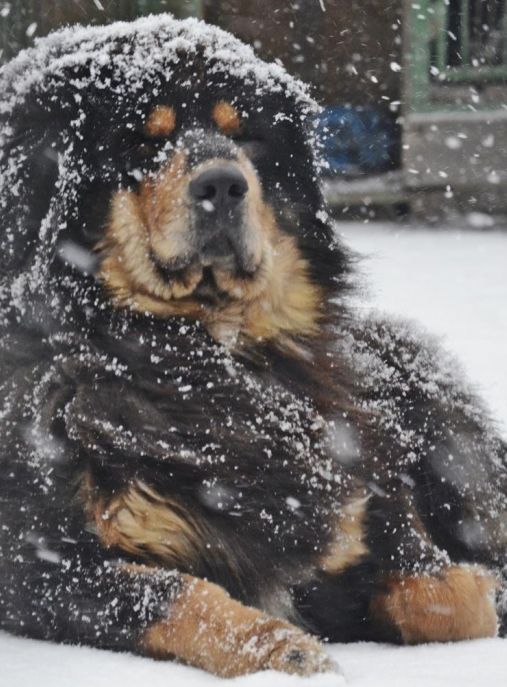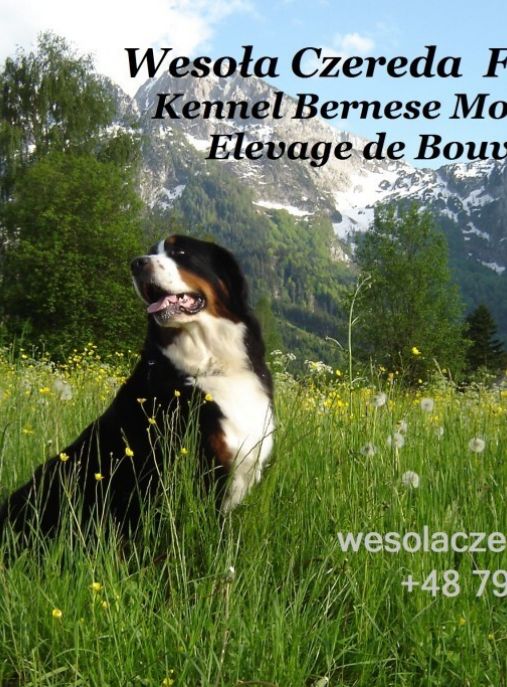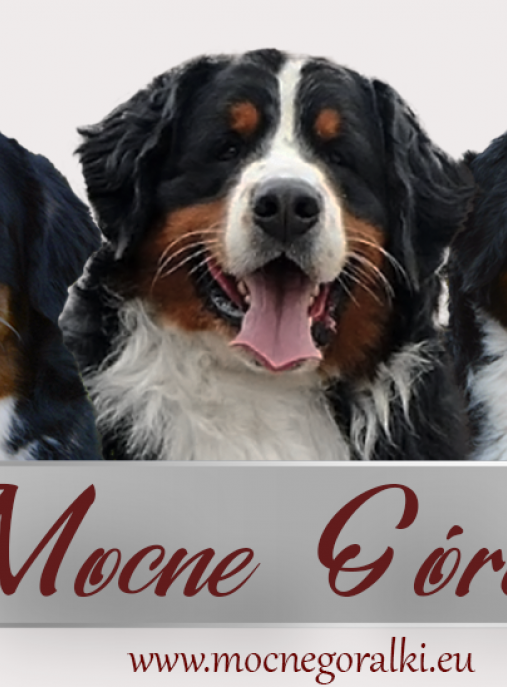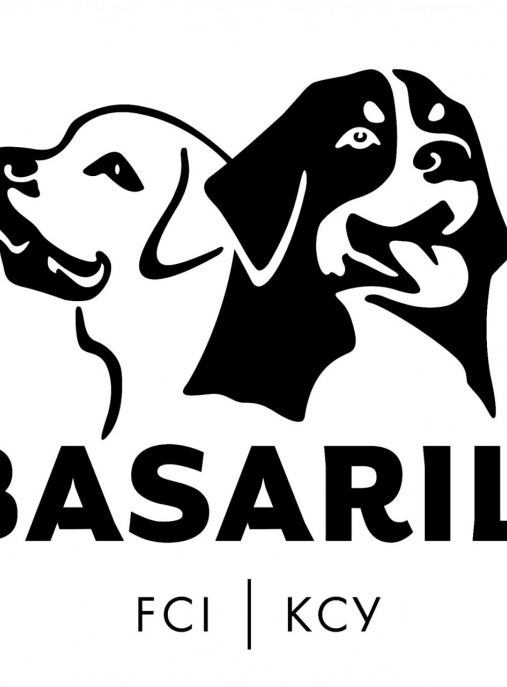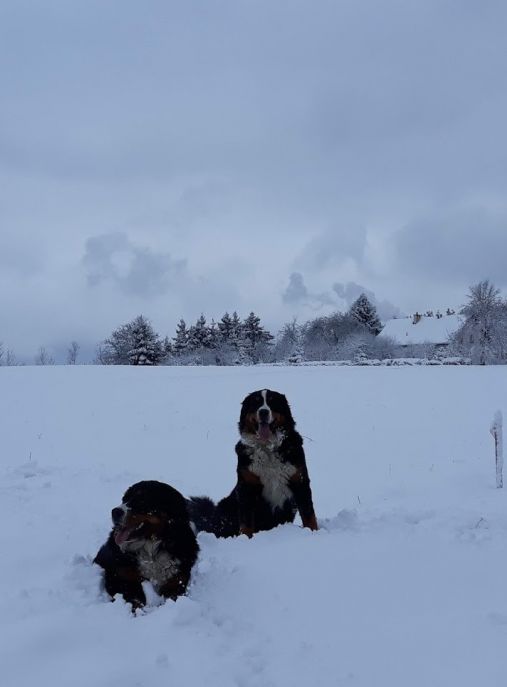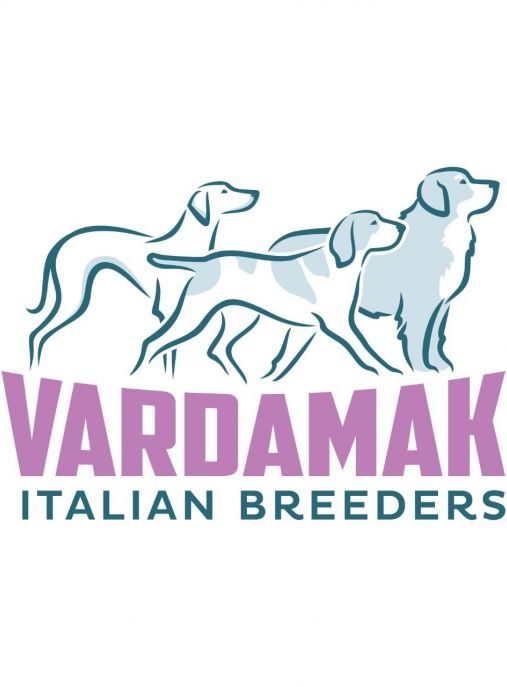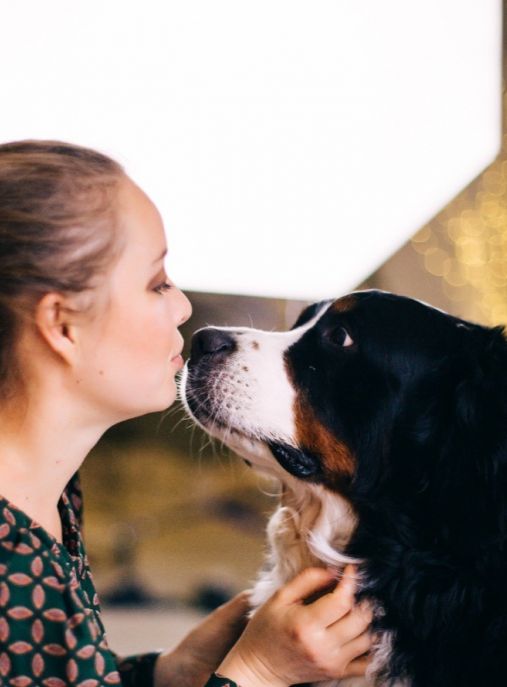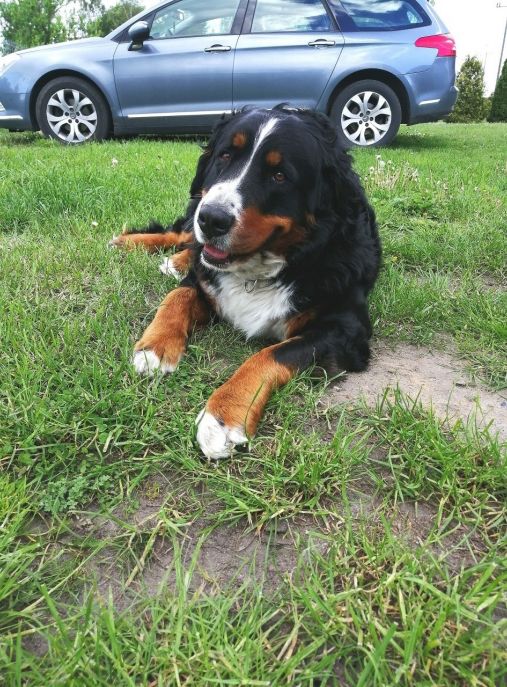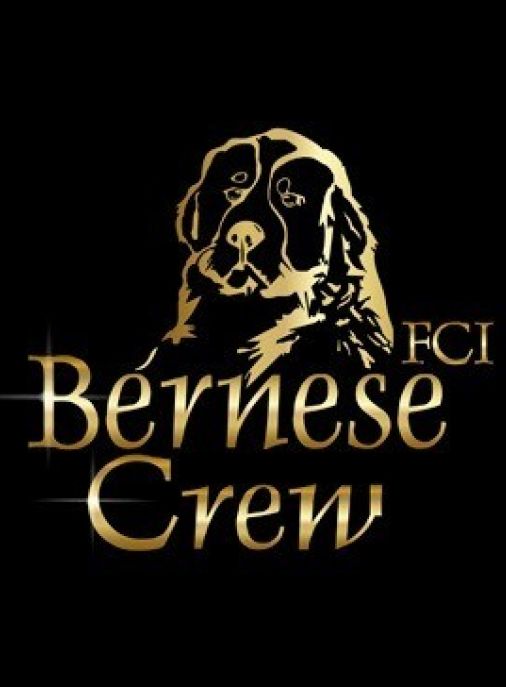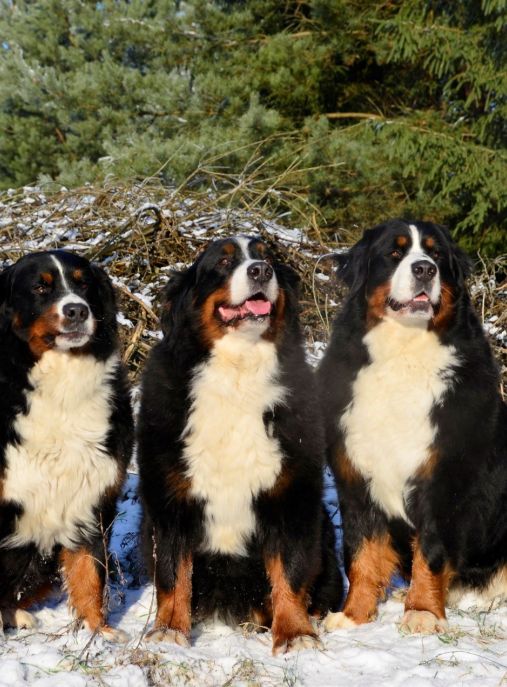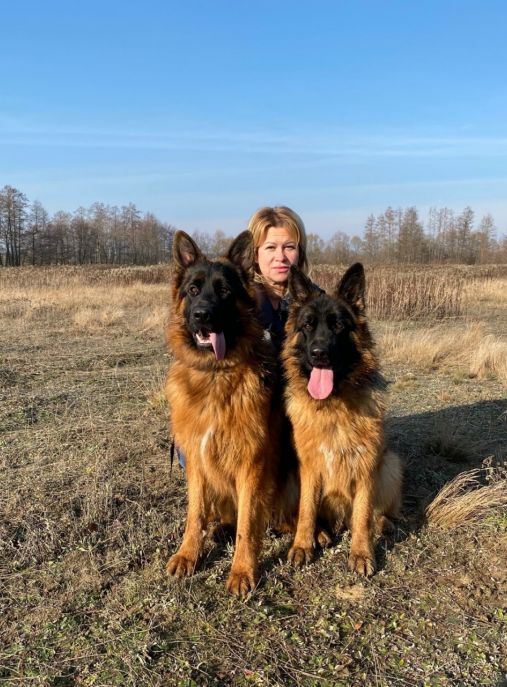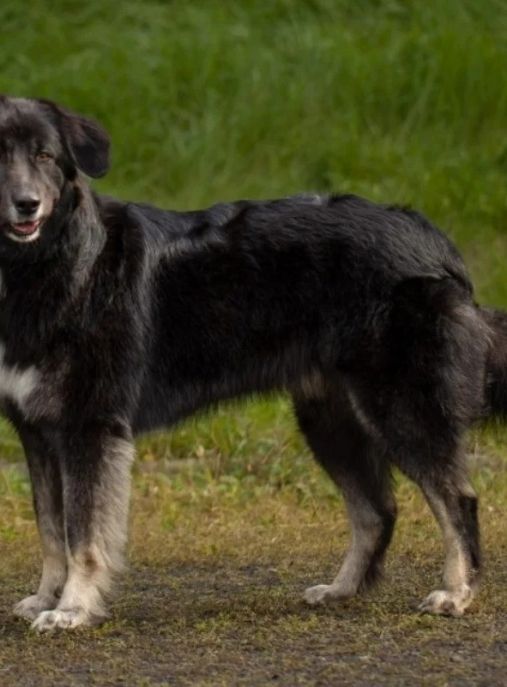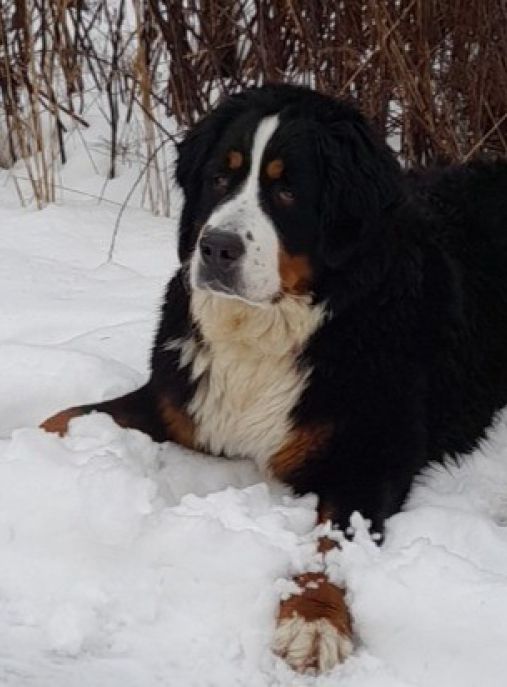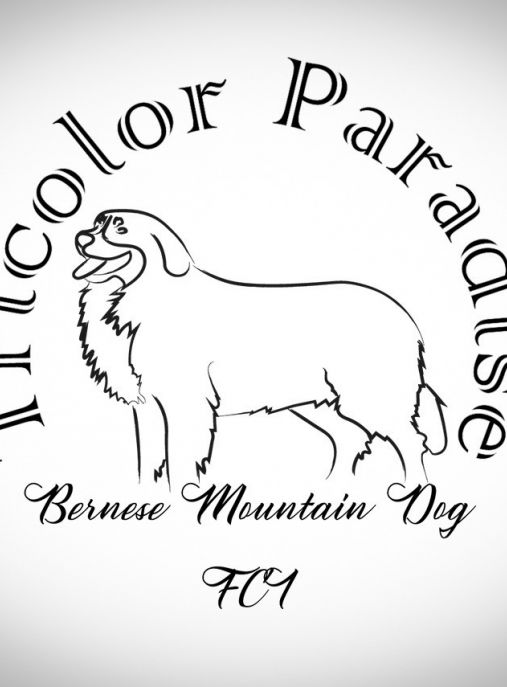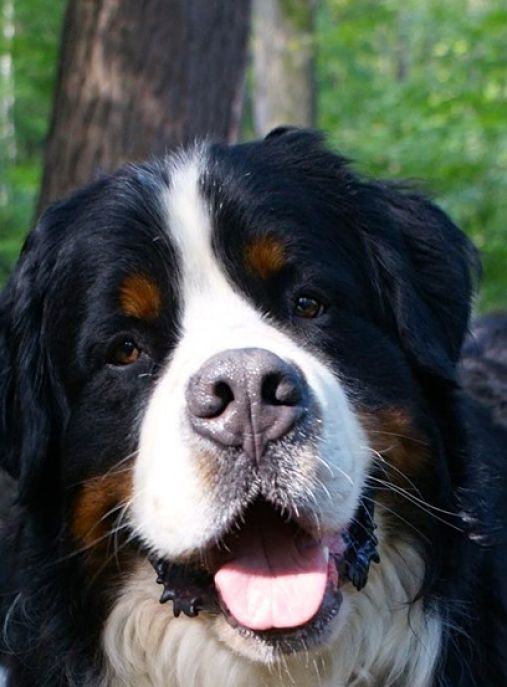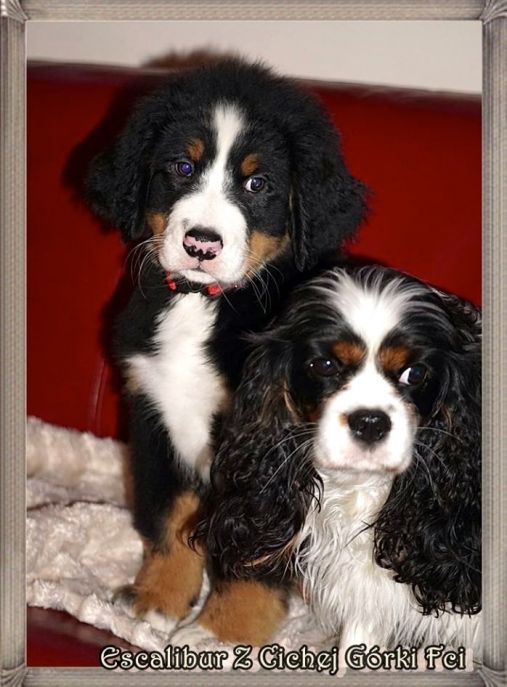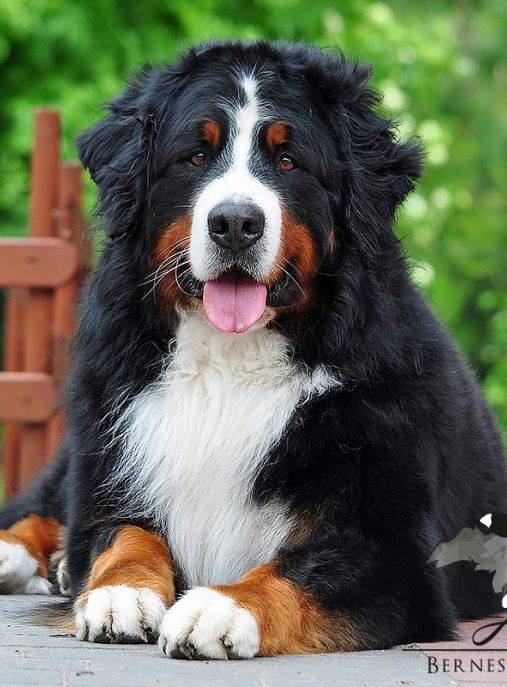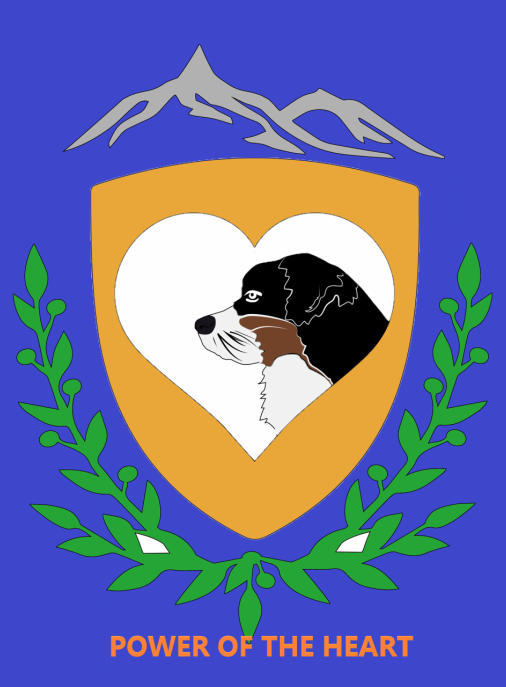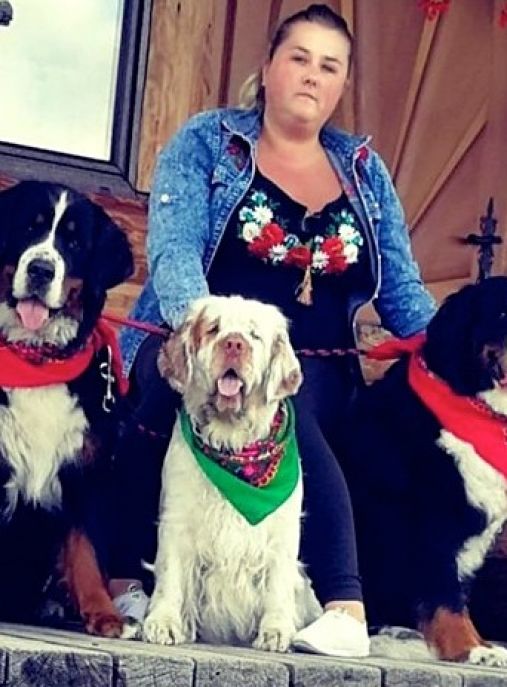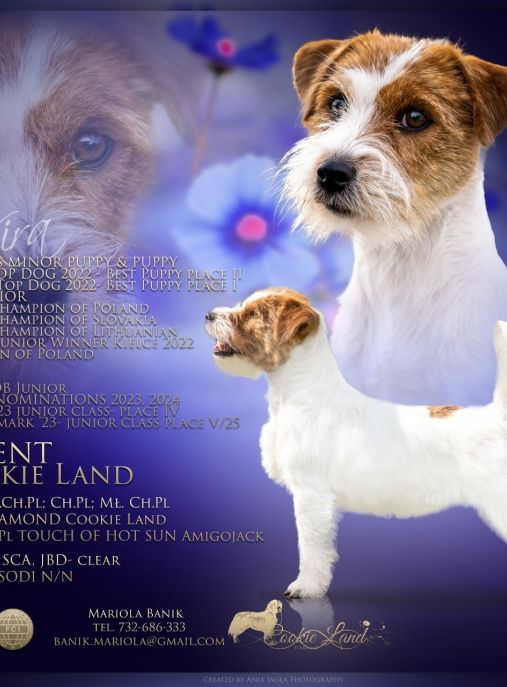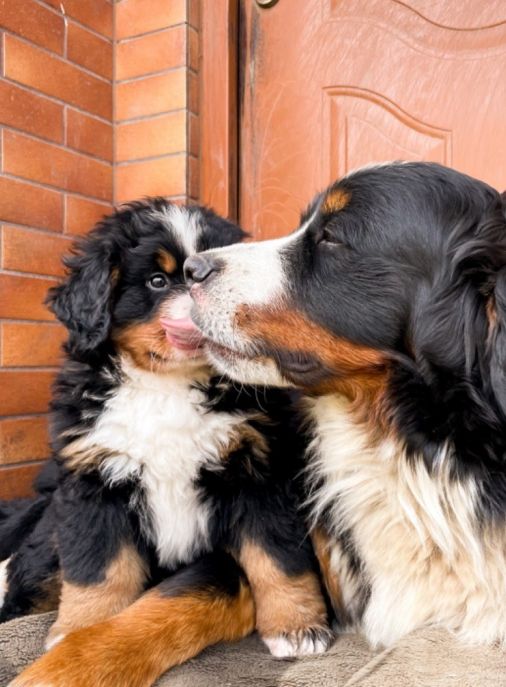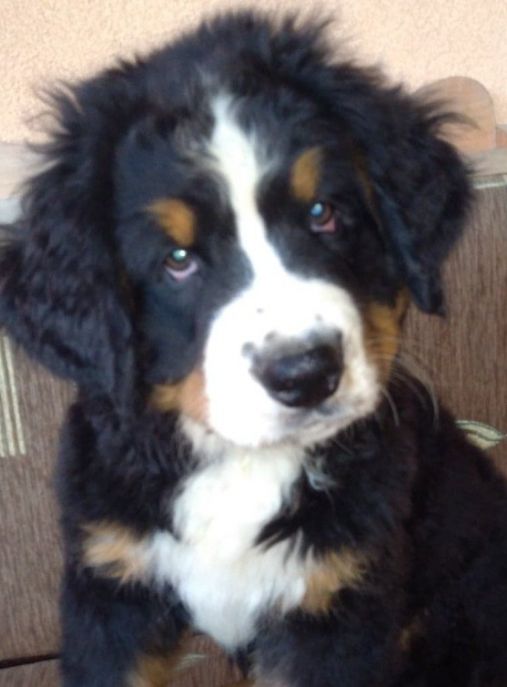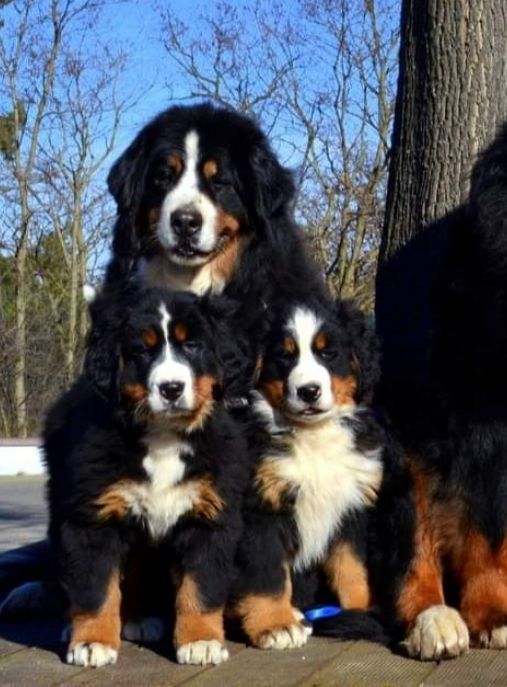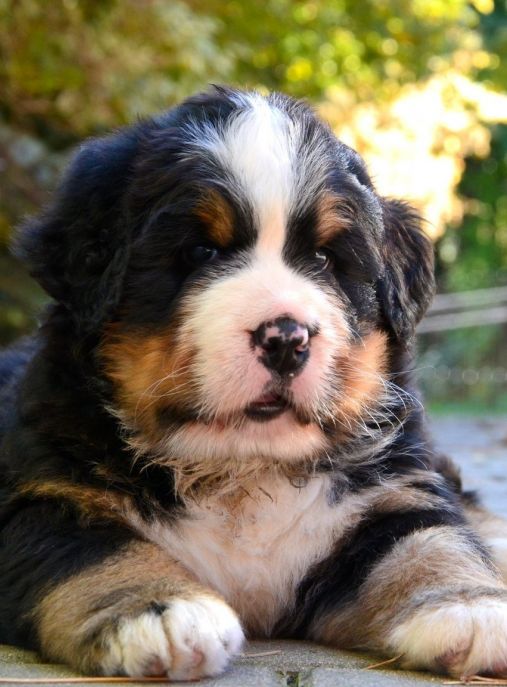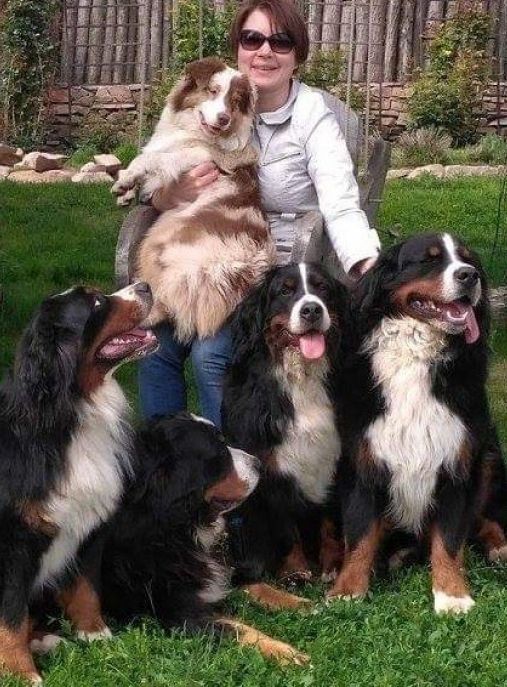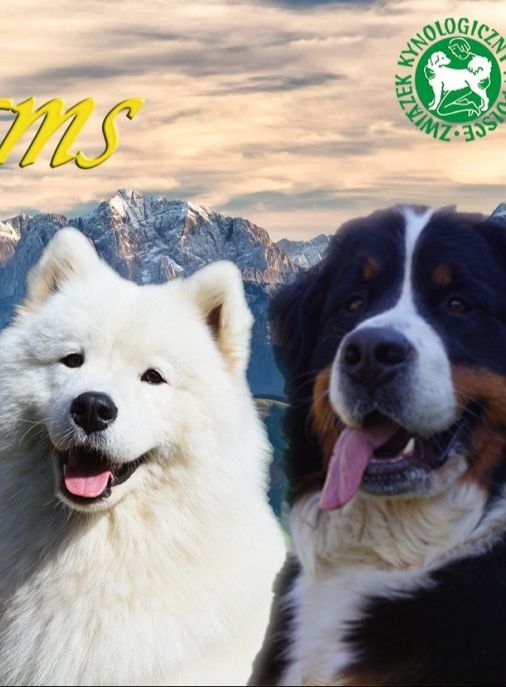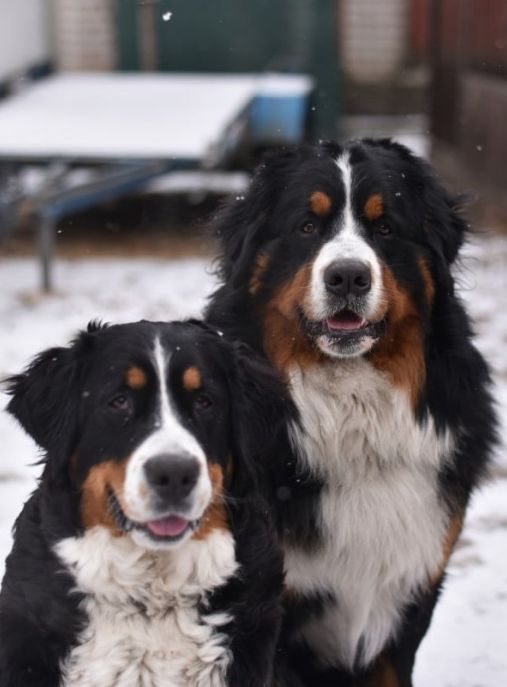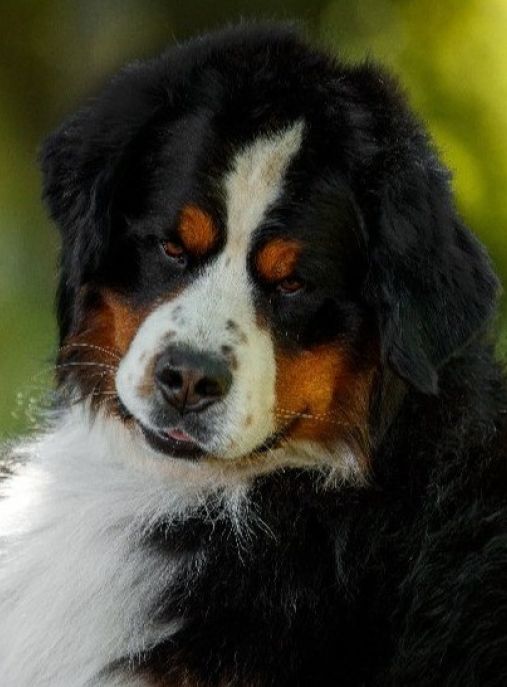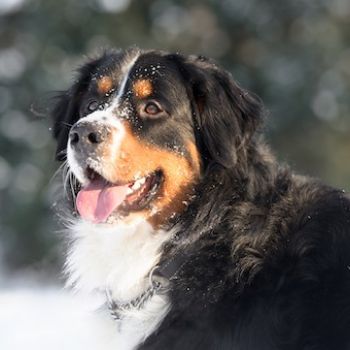The Bernese Mountain Dog, also known as the Berner Sennenhund or Bernese Cattle Dog, is a large and powerful breed that originated in Switzerland. With its striking tri-color coat, gentle nature, and strong work ethic, the Bernese Mountain Dog has become a beloved companion and working dog around the world.
The history of the Bernese Mountain Dog can be traced back to the Swiss Alps, where it was primarily used as a farm dog. It is believed that the breed's ancestors were brought to Switzerland by the Romans over 2,000 years ago. These dogs were then crossed with local herding and working dogs, resulting in the development of the Bernese Mountain Dog we know today.
According to the FCI (Fédération Cynologique Internationale) typology, the Bernese Mountain Dog belongs to Group 2: Pinscher and Schnauzer - Molossoid and Swiss Mountain and Cattle Dogs. This group includes breeds that are known for their guarding, herding, and working abilities. The Bernese Mountain Dog falls under Section 3: Swiss Mountain and Cattle Dogs, along with other Swiss breeds like the Appenzeller Sennenhund, Entlebucher Mountain Dog, and Greater Swiss Mountain Dog.
Bernese Mountain Dogs are known for their friendly and affectionate nature, making them excellent family pets. They are loyal and gentle with children, making them great companions for families with kids. However, due to their large size, they may unintentionally knock over small children, so supervision is necessary.
In addition to being wonderful family pets, Bernese Mountain Dogs are also highly versatile working dogs. They were originally bred to assist farmers in the Swiss Alps, herding cattle, pulling carts, and guarding the farm. Today, they excel in various activities such as obedience, agility, tracking, and even therapy work. Their intelligence and eagerness to please make them quick learners and adaptable to different tasks.
In terms of physical characteristics, the Bernese Mountain Dog is a large and sturdy breed. Males typically stand between 24 to 28 inches (61 to 71 cm) at the shoulder, while females are slightly smaller, ranging from 23 to 27 inches (58 to 69 cm). They have a well-muscled body with a broad chest and a strong neck. Their head is proportionate to their body, featuring a flat skull, a well-defined stop, and a strong muzzle. The breed's most distinctive feature is its tri-color coat, which consists of a base of jet black with rust-colored markings on the cheeks, legs, and chest, as well as white markings on the face, chest, and tail tip.
As for weight, adult Bernese Mountain Dogs typically range from 80 to 115 pounds (36 to 52 kg), with males being heavier than females. Despite their large size, they are known for their gentle and calm temperament. They are generally good-natured, patient, and friendly, making them excellent companions for families and individuals alike.
The average lifespan of a Bernese Mountain Dog is around 7 to 10 years. Unfortunately, like many large breeds, they are prone to certain health issues, including hip and elbow dysplasia, cancer, and bloat. Regular exercise, a balanced diet, and routine veterinary care are essential for maintaining their overall health and well-being.
It's worth noting that Bernese Mountain Dogs have a thick double coat that requires regular grooming to keep it in good condition. They shed moderately throughout the year, with heavier shedding occurring during seasonal changes. Brushing their coat a few times a week helps to remove loose hair and prevent matting. Additionally, their ears should be checked regularly for signs of infection, and their nails should be trimmed regularly to prevent overgrowth.
In conclusion, the Bernese Mountain Dog is a magnificent breed with a rich history and a gentle temperament. Whether as a loyal family companion or a versatile working dog, they bring joy and love to the lives of those fortunate enough to have them. With proper care, training, and socialization, the Bernese Mountain Dog can thrive and become a cherished member of any household.
The Bernese Mountain Dog, also known as the Berner Sennenhund, is a majestic and gentle giant that possesses a remarkable character. With their striking appearance and warm temperament, these dogs have captured the hearts of many dog lovers around the world. In this text, we will delve into the extensive description of the character of Bernese Mountain Dogs, their behavior, and how to raise and train them.
One of the most prominent traits of Bernese Mountain Dogs is their calm and gentle nature. They are known for their friendly and affectionate disposition, making them excellent family pets. These dogs thrive on human companionship and are incredibly loyal to their families. They are often referred to as "gentle giants" due to their patient and tolerant nature, especially towards children. Berners are known to be excellent with kids, making them an ideal choice for families with young ones.
Despite their large size, Bernese Mountain Dogs are not aggressive or dominant. They are generally good-natured and get along well with other animals, including other dogs. However, early socialization is crucial to ensure they grow up to be well-rounded and friendly dogs. Introducing them to various people, animals, and environments from a young age will help them develop into confident and well-behaved companions.
These dogs have a strong work ethic and were originally bred as working dogs in the Swiss Alps. They possess a natural instinct to protect and guard their loved ones, making them excellent watchdogs. Berners are typically alert and will bark to alert their family of any potential danger. However, they are not excessive barkers and are generally quiet and reserved.
When it comes to training, Bernese Mountain Dogs are intelligent and eager to please. They respond well to positive reinforcement techniques, such as praise, treats, and play. However, it is important to note that they can be sensitive, so harsh training methods or punishment should be avoided. Consistency and patience are key when training a Berner, as they may take a little longer to grasp commands compared to some other breeds.
Exercise is essential for Bernese Mountain Dogs to keep them physically and mentally stimulated. Despite their large size, they are not overly energetic dogs. Daily walks, playtime, and mental stimulation through puzzle toys or training sessions are usually sufficient to meet their exercise needs. However, it is important to avoid excessive exercise during their growth phase to prevent joint problems, as they are prone to certain health issues.
Grooming a Bernese Mountain Dog requires regular attention due to their thick, double coat. They have a long, silky topcoat and a dense undercoat that helps protect them from harsh weather conditions. Brushing their coat at least once or twice a week will help prevent matting and keep their fur healthy and shiny. During shedding seasons, which occur twice a year, more frequent brushing is necessary to manage the shedding.
In conclusion, Bernese Mountain Dogs are gentle, loyal, and affectionate companions. Their calm and patient nature, combined with their protective instincts, make them excellent family pets. With proper socialization, training, and exercise, these majestic dogs can thrive in various living situations. If you are looking for a devoted and loving companion, the Bernese Mountain Dog may be the perfect addition to your family.
The Bernese Mountain Dog is a large and majestic breed known for its friendly nature and striking appearance. Caring for these dogs requires a combination of love, attention, and specific considerations due to their size and unique needs. In this text, I will provide an extensive description of the recommended care for Bernese Mountain Dogs, including tips on what to do and what not to do.
First and foremost, Bernese Mountain Dogs require regular exercise to maintain their physical and mental well-being. Daily walks, playtime, and access to a secure outdoor area are essential. However, it's important to avoid excessive exercise, especially during their growth stages, as it can put strain on their developing joints. Consult with your veterinarian to determine the appropriate exercise routine for your Bernese Mountain Dog based on their age and health condition.
Grooming is another crucial aspect of Bernese Mountain Dog care. Their thick, double coat requires regular brushing to prevent matting and to remove loose hair. Aim to brush them at least once or twice a week, and more frequently during shedding seasons. Additionally, regular nail trims, ear cleaning, and teeth brushing are necessary to maintain their overall hygiene.
Proper nutrition is vital for the health and longevity of Bernese Mountain Dogs. Choose a high-quality dog food that is specifically formulated for large breeds. Ensure that the food contains the right balance of proteins, fats, and carbohydrates to support their growth and energy needs. Avoid overfeeding, as Bernese Mountain Dogs are prone to obesity, which can lead to various health issues. Consult with your veterinarian to determine the appropriate portion sizes and feeding schedule for your dog.
Regular veterinary check-ups are essential for Bernese Mountain Dogs. They are prone to certain health conditions, including hip and elbow dysplasia, cancer, and bloat. Early detection and treatment can significantly improve their quality of life. Stay up to date with vaccinations, parasite prevention, and dental care as recommended by your veterinarian.
Socialization and training are crucial for Bernese Mountain Dogs. They are intelligent and eager to please, making them relatively easy to train. Start socializing them from a young age, exposing them to various people, animals, and environments. Positive reinforcement training methods work best with this breed, as they respond well to praise and rewards. Enroll them in puppy classes or seek the guidance of a professional dog trainer to ensure they grow up to be well-behaved and obedient companions.
When caring for Bernese Mountain Dogs, it's important to provide them with a comfortable and safe living environment. They are indoor dogs that thrive on human companionship, so avoid leaving them alone for extended periods. Ensure they have a cozy bed or crate where they can rest, and provide them with plenty of toys and mental stimulation to prevent boredom.
Lastly, it's crucial to avoid certain activities or conditions that can be harmful to Bernese Mountain Dogs. They are sensitive to heat and can easily overheat, so avoid exercising them during the hottest parts of the day and provide them with shade and fresh water at all times. Additionally, avoid excessive jumping or stair climbing, as it can strain their joints and potentially lead to injuries.
In conclusion, caring for a Bernese Mountain Dog requires dedication, time, and attention to their specific needs. Regular exercise, grooming, proper nutrition, veterinary care, socialization, and training are all essential aspects of their care. By following these tips and providing a loving and nurturing environment, you can ensure that your Bernese Mountain Dog lives a happy and healthy life.
The Bernese Mountain Dog, known for its majestic appearance and gentle nature, possesses a striking and distinctive coat color that adds to its allure. The common color of dogs belonging to this breed is a rich and lustrous tricolor combination of black, white, and rust.
The primary color of the Bernese Mountain Dog is black, which forms the base of its coat. The black hue is deep and intense, providing a stark contrast against the other colors present. It covers the majority of the body, including the back, sides, and top of the head. The black coloration extends down the neck, shoulders, and tail, creating a harmonious flow throughout the dog's physique.
Complementing the black coat are patches of white, which are strategically distributed across the dog's body. These white markings are typically found on the chest, paws, and the tip of the tail. They add a touch of brightness and balance to the overall color scheme, creating a captivating visual contrast against the black background.
The third color that completes the tricolor combination is rust, also referred to as tan or mahogany. This warm and earthy shade appears in specific areas, enhancing the dog's appearance with its vibrant and eye-catching presence. Rust-colored markings are commonly seen above the eyes, on the cheeks, on the sides of the muzzle, and on the legs. These patches of rust contribute to the breed's distinctive and recognizable look.
The distribution of these colors is not random but follows a specific pattern. The black color dominates the majority of the body, while the white markings are strategically placed to create a balanced and symmetrical appearance. The rust-colored patches, on the other hand, are carefully positioned to highlight the dog's facial features and add depth to its overall appearance.
The coat of a Bernese Mountain Dog is not only visually appealing but also serves a practical purpose. It is thick, dense, and weather-resistant, providing protection against the harsh elements of the mountainous regions from which the breed originates. This double coat consists of a longer outer layer and a soft, insulating undercoat, ensuring the dog's comfort in various climates.
In conclusion, the common color of Bernese Mountain Dog dogs is a captivating tricolor combination of black, white, and rust. The deep black base, complemented by strategically placed white markings and vibrant rust-colored patches, creates a visually stunning and distinctive appearance. This color scheme, combined with the breed's gentle temperament and impressive size, makes the Bernese Mountain Dog a truly remarkable and beloved companion.
The Bernese Mountain Dog is a large and majestic breed known for its friendly nature and striking appearance. While generally a healthy breed, like any other, they are prone to certain health issues that owners should be aware of. Proper care and regular veterinary check-ups are essential to ensure the well-being of these dogs.
One of the most common health concerns in Bernese Mountain Dogs is hip and elbow dysplasia. This is a genetic condition where the hip or elbow joint does not develop properly, leading to pain, lameness, and arthritis. Regular exercise on soft surfaces and maintaining a healthy weight can help reduce the risk of developing dysplasia. Additionally, breeders should screen their dogs for these conditions before breeding to minimize the chances of passing it on to offspring.
Another prevalent health issue in Bernese Mountain Dogs is cancer. They are particularly susceptible to a type of cancer called histiocytic sarcoma, which affects the immune system. Regular check-ups and early detection are crucial in managing and treating cancer. It is recommended to keep an eye out for any unusual lumps, bumps, or changes in behavior and consult a veterinarian if any concerns arise.
Gastric dilatation-volvulus (GDV), commonly known as bloat, is a life-threatening condition that can affect Bernese Mountain Dogs. It occurs when the stomach fills with gas and twists, cutting off blood supply to the organs. This can lead to shock and rapid deterioration if not treated promptly. To prevent bloat, it is advisable to feed multiple small meals throughout the day, avoid exercise immediately after meals, and use elevated feeding bowls.
Bernese Mountain Dogs are also prone to various eye conditions, including progressive retinal atrophy (PRA) and cataracts. PRA is a degenerative disease that leads to vision loss, while cataracts cause clouding of the lens. Regular eye examinations by a veterinary ophthalmologist can help detect these conditions early on, allowing for appropriate management or treatment.
Maintaining a healthy diet is crucial for the overall well-being of Bernese Mountain Dogs. A balanced diet, tailored to their specific needs, can help prevent obesity and reduce the risk of certain health issues. It is important to provide high-quality dog food that is appropriate for their age, size, and activity level. Regular exercise is also essential to keep them fit and mentally stimulated.
Grooming is another aspect of caring for Bernese Mountain Dogs. Their thick, double coat requires regular brushing to prevent matting and to remove loose hair. They shed heavily, especially during seasonal changes, so frequent brushing can help keep their coat healthy and minimize shedding around the house. Additionally, regular dental care, including brushing their teeth and providing dental chews, is important to maintain good oral hygiene.
Regular veterinary check-ups are vital for early detection and prevention of health issues. Vaccinations, parasite prevention, and routine blood tests are part of a comprehensive healthcare plan for Bernese Mountain Dogs. It is also recommended to spay or neuter them to prevent certain reproductive-related health problems.
In conclusion, while Bernese Mountain Dogs are generally healthy, they are prone to specific health issues that owners should be aware of. Regular veterinary care, a balanced diet, exercise, and proper grooming are essential for maintaining their overall health and well-being. With proper care and attention, these gentle giants can live long, happy lives.
The Bernese Mountain Dog is a large and majestic breed known for its gentle nature and striking appearance. To ensure the health and well-being of these magnificent dogs, it is crucial to provide them with a balanced and nutritious diet. Proper nutrition plays a vital role in maintaining their overall health, promoting longevity, and preventing common health issues.
When it comes to feeding a Bernese Mountain Dog, it is essential to consider their size, activity level, age, and any specific dietary requirements. Here are some guidelines and advice on how to feed and what to avoid when it comes to the nutrition of Bernese Mountain Dogs:
1. High-Quality Dog Food: Choose a premium-quality dog food that is specifically formulated for large breeds. Look for a brand that lists real meat as the primary ingredient, such as chicken, beef, or fish. Avoid foods that contain fillers, by-products, or artificial additives.
2. Balanced Diet: Ensure that the dog food provides a balanced combination of protein, carbohydrates, fats, vitamins, and minerals. Protein is particularly important for muscle development and repair. Aim for a minimum of 18-22% protein content in their diet.
3. Controlled Caloric Intake: Bernese Mountain Dogs are prone to obesity, which can lead to various health issues. Monitor their caloric intake and adjust the portion sizes according to their age, activity level, and metabolism. Consult with your veterinarian to determine the appropriate daily calorie intake for your dog.
4. Feeding Schedule: Divide their daily food into two or three meals to prevent bloating and aid digestion. Avoid feeding immediately before or after exercise to reduce the risk of gastric torsion (bloat).
5. Fresh Water: Provide clean and fresh water at all times. Hydration is crucial for their overall health and helps maintain proper organ function.
6. Supplements: Consult with your veterinarian before adding any supplements to your dog's diet. In some cases, supplements like glucosamine and chondroitin may be beneficial for joint health, as Bernese Mountain Dogs are prone to hip and elbow dysplasia.
7. Avoid Overfeeding: Bernese Mountain Dogs have a tendency to overeat, so it's important to avoid free-feeding or leaving food out all day. Stick to the recommended portion sizes and avoid giving excessive treats or table scraps.
8. Avoid Certain Foods: Some human foods are toxic to dogs and should be avoided at all costs. These include chocolate, grapes, raisins, onions, garlic, caffeine, alcohol, and anything containing xylitol. Additionally, avoid feeding them fatty foods, as it can lead to pancreatitis.
9. Regular Exercise: Along with a nutritious diet, regular exercise is essential for maintaining a healthy weight and overall well-being. Engage in daily walks, play sessions, and other activities suitable for their size and age.
10. Regular Veterinary Check-ups: Schedule regular check-ups with your veterinarian to monitor your Bernese Mountain Dog's health, weight, and nutritional needs. They can provide personalized advice and recommend any necessary dietary adjustments.
Remember, every Bernese Mountain Dog is unique, and their nutritional needs may vary. It's crucial to consult with your veterinarian to create a tailored diet plan that suits your dog's specific requirements. By providing a balanced and nutritious diet, you can ensure that your Bernese Mountain Dog thrives and enjoys a long and healthy life.
